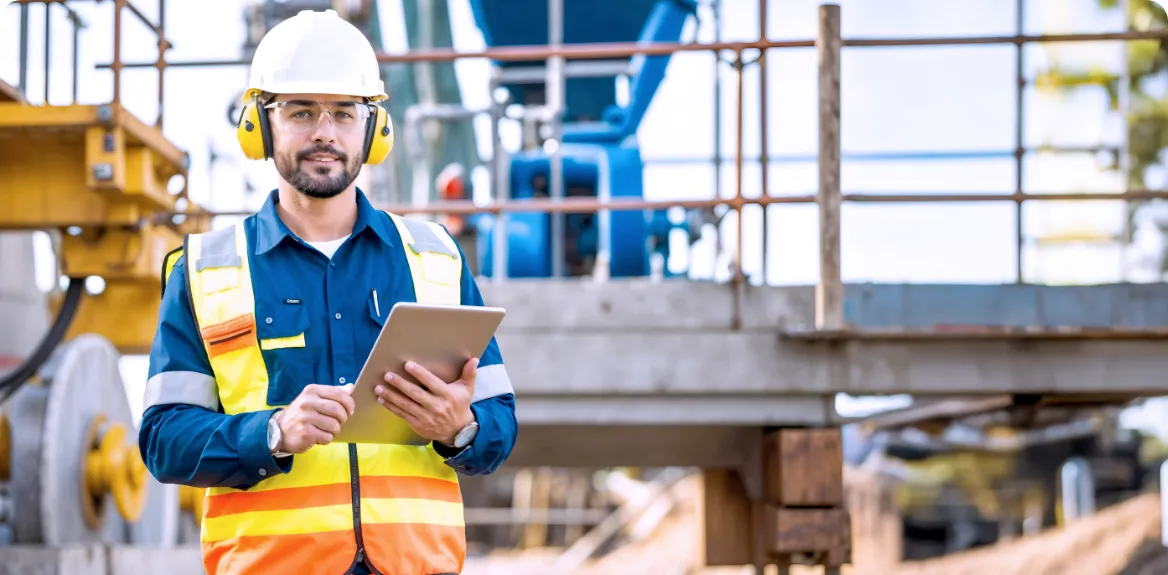
The Internet of Things (IoT) revolutionizes construction by enabling real-time data collection, enhancing project planning, and boosting sustainability through advanced technologies. This article explores its benefits, technologies, and implementation steps to drive excellence in construction projects.
The construction industry is undergoing a significant transformation, driven by cutting-edge technologies that enhance operational efficiency, safety, and productivity. At the forefront of this revolution is the Internet of Things (IoT), which is reshaping the way construction companies manage projects, resources, and safety protocols. By leveraging IoT, construction businesses can harness real-time data, streamline operations, and drive innovation in a way that significantly enhances both project outcomes and profitability.
In this article, we explore how IoT is transforming the construction industry, delving into its key benefits, underlying technologies, and its role in driving the future of construction companies.
The Internet of Things (IoT) in construction refers to the integration of smart devices, sensors, and internet-based systems that allow construction teams to monitor and manage resources in real time. IoT connects various elements of the construction site, such as equipment, materials, and personnel, to a central system that tracks data and coordinates activities with unprecedented precision.
Rather than just providing basic connectivity, IoT offers real-time visibility into resource availability and usage, enabling project managers to make proactive decisions, reduce costs, and improve productivity. By using IoT to manage operations, construction projects can be completed faster, safer, and more cost-effectively, paving the way for digital transformation in the construction industry.
The internet of things (IoT) in construction is not just a passing trend. It represents a strategic leap forward for the industry, with projections showing the market will grow from $12.3 billion in 2022 to $26.5 billion by 2027, driven by a compound annual growth rate (CAGR) of 16.5%. (Source: MarketsandMarkets).
Several cutting-edge technologies work together to enable the Internet of Things (IoT) in construction, creating a connected, intelligent ecosystem:
Competitors often fail to provide tangible examples of how IoT improves construction project timelines, safety, and cost-efficiency. For instance, IoT has been shown to reduce project delays by up to 20% through real-time equipment tracking and resource management. This leads to smoother operations and better adherence to timelines.
Another area often neglected is the integration of AI and edge computing within IoT systems. AI-driven IoT solutions can predict equipment failures up to 30% earlier than traditional methods, reducing downtime and maintenance costs. By processing data on-site, edge computing enables faster decision-making and ensures operations continue without delay, even without constant cloud connectivity.
While IoT in construction is commonly associated with regulatory compliance, few competitors focus on how IoT enhances proactive safety. Real-time monitoring allows for hazard detection (e.g., equipment malfunctions, worker health issues) and instant alerts, preventing accidents before they happen. This proactive safety approach can reduce workplace incidents by 15% or more, safeguarding workers and mitigating liability risks.
A significant gap in many IoT-focused construction articles is the lack of emphasis on predictive maintenance. IoT sensors can detect early signs of equipment wear and tear, allowing for scheduled maintenance before costly breakdowns occur. This proactive approach reduces repair costs by up to 25% and extends the lifespan of machinery, ultimately saving companies money and minimizing downtime.
Competitors often overlook the full potential of IoT-generated data. By utilizing advanced analytics, construction managers can gain deeper insights into project performance, uncover inefficiencies, and optimize resource allocation. The ability to analyze real-time data for better forecasting and decision-making can improve project profitability and reduce budget overruns by up to 10%, helping firms stay competitive in a rapidly evolving market.
Another gap in competitor content is IoT's role in pre-construction planning. While many articles touch on the Internet of Things (IoT) in the operational phase of construction, fewer focus on its impact during the planning and design stages, where IoT can play a pivotal role. By leveraging IoT technologies early in a project's lifecycle, construction teams can enhance site surveying, improve resource forecasting, and better estimate project costs and timelines.
For example, IoT devices equipped with GPS technology and advanced sensors can create detailed digital twins of construction sites, improving the accuracy of site surveys. This not only enhances decision-making regarding project scope but also improves accuracy in material forecasting, workforce planning, and even the logistics of equipment management. Real-time data provided by IoT devices can allow construction teams to adjust their project strategies, preventing costly mistakes later in the project timeline.
One area that is frequently overlooked by top competitors is the role of the Internet of Things (IoT) in environmental monitoring. Construction projects are under increasing pressure to meet sustainability goals, including reducing energy consumption and monitoring environmental factors like air quality, noise levels, and energy usage. IoT-enabled sensors are essential in helping construction managers stay on top of these metrics in real time, ensuring compliance with environmental regulations and improving the sustainability of operations.
For instance, IoT devices can monitor the levels of carbon emissions and particulate matter at construction sites, providing valuable data that can be used to reduce pollution. These technologies allow for early detection of potential environmental hazards, such as hazardous air quality or excessive noise levels, before they affect the surrounding communities or project timelines. The integration of smart meters and environmental sensors can also help reduce energy waste by providing feedback on energy consumption patterns, enabling more efficient resource management.
To unlock the full potential of IoT in construction projects and drive tangible outcomes, it’s essential to follow a strategic, data-driven approach. Here’s how to successfully implement IoT to improve efficiency, safety, and cost-effectiveness:
To optimize project management, equip construction sites with IoT-enabled sensors that continuously collect and transmit data. These sensors provide real-time monitoring of equipment performance, environmental conditions, and worker activities, helping stay ahead of potential issues and streamline operations. Real-time data empowers teams to make more informed decisions, reduce costly delays, and improve overall project timelines.
Integrating AI into IoT system predicts maintenance needs before issues escalate. IoT sensors combined with AI can predict equipment failures up to 30% earlier than traditional methods, preventing unexpected downtime and expensive repairs. Additionally, edge computing allows critical data to be processed on-site, enabling immediate decision-making without relying on constant cloud connectivity, thus keeping operations efficient even in remote locations.
IoT-powered solutions like RFID and real-time tracking provide unparalleled visibility into the supply chain. By automating inventory management, construction companies can ensure materials are ordered just in time, reduce waste, and prevent project delays caused by supply shortages. This level of efficiency helps minimize project costs and ensures that construction timelines are met with accuracy.
Safety is a top priority in construction, and IoT-based safety systems take it to the next level. Real-time monitoring of worker health and equipment performance allows for proactive hazard detection and instant alerts. For example, IoT systems can monitor fatigue levels, detect dangerous environmental conditions, and track safety compliance, significantly reducing the risk of accidents and improving the overall safety record of the site. This proactive approach can decrease workplace injuries by up to 15%, lowering both costs and liability.
IoT generates a vast amount of valuable data that can be used to make smarter, data-driven decisions. By integrating IoT with advanced data analytics tools, construction managers can optimize project planning, budgeting, and resource allocation. Continuous analysis of real-time data helps identify inefficiencies, forecast potential delays, and make informed decisions to improve overall project profitability. In fact, IoT data-driven project adjustments have been shown to reduce budget overruns by as much as 10%.
As construction projects become more complex, embracing the Internet of Things (IoT) is essential for staying competitive in a rapidly digitalizing industry. IoT not only streamlines processes but also drives significant improvements in efficiency, safety, and profitability. By adopting these technologies, construction companies can ensure they are well-positioned for future growth and innovation.


